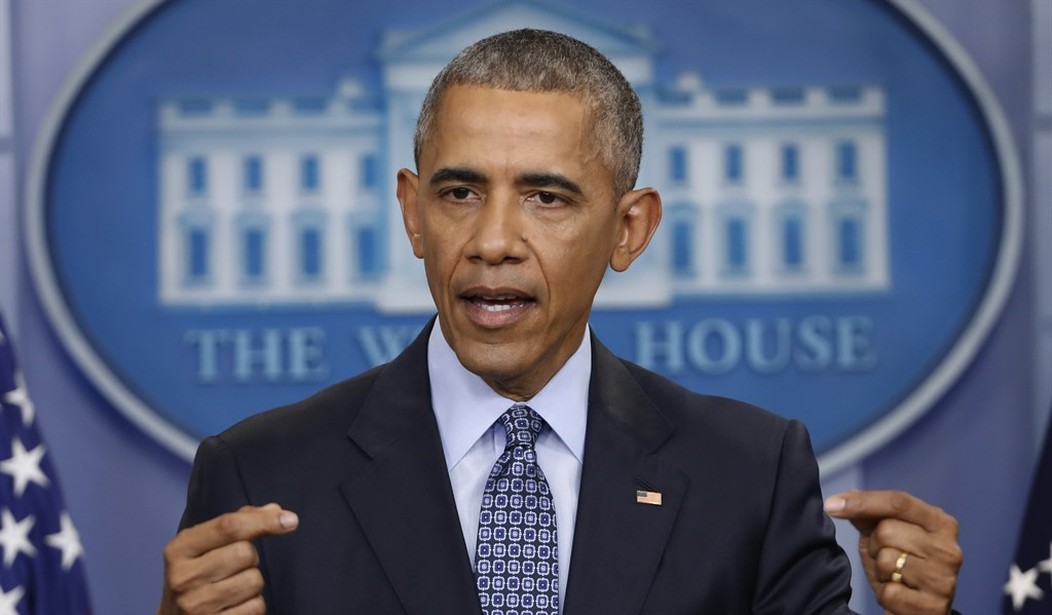For good reason, the Iran nuclear agreement has been deeply unpopular and viewed with much skepticism since its signing in 2013.
Not only did the Obama administration negotiate the agreement without a guarantee Iran wouldn't eventually build a nuclear bomb, President Obama and his State Department approved a number of secret side deals that have been exposed in the aftermath of negotiations. One of those secret deals included $400 billion in cash sent to Tehran in the middle of the night on an airplane. When caught, the administration initially denied the transaction and then later admitted much of the untraceable cash would likely to go to terrorism. After all, Iran is the world's most prolific state-sponsor of terrorist organizations like Hamas and Hezbollah.
But now, we're learning more about the details of the Iran nuclear agreement and the threats it poses to the future of U.S. and global security. POLITICO is out with an astonishing report today detailing the terms of a last minute prisoner swap deal made by the Obama administration just days before President Obama left the White House. It included the release of terrorists previously held by the United States and worse, the administration essentially gave immunity to an Iranian operative who had smuggled parts needed to build a nuclear bomb into Iran from China. Bolding is mine:
When President Barack Obama announced the “one-time gesture” of releasing Iranian-born prisoners who “were not charged with terrorism or any violent offenses” last year, his administration presented the move as a modest trade-off for the greater good of the Iran nuclear agreement and Tehran’s pledge to free five Americans.
But Obama, the senior official and other administration representatives weren’t telling the whole story on Jan. 17, 2016, in their highly choreographed rollout of the prisoner swap and simultaneous implementation of the six-party nuclear deal, according to a POLITICO investigation.
In his Sunday morning address to the American people, Obama portrayed the seven men he freed as “civilians.” The senior official described them as businessmen convicted of or awaiting trial for mere “sanctions-related offenses, violations of the trade embargo.”
In reality, some of them were accused by Obama’s own Justice Department of posing threats to national security. Three allegedly were part of an illegal procurement network supplying Iran with U.S.-made microelectronics with applications in surface-to-air and cruise missiles like the kind Tehran test-fired recently, prompting a still-escalating exchange of threats with the Trump administration.
And in a series of unpublicized court filings, the Justice Department dropped charges and international arrest warrants against 14 other men, all of them fugitives.
Three of the fugitives allegedly sought to lease Boeing aircraft for an Iranian airline that authorities say had supported Hezbollah, the U.S.-designated terrorist organization. A fourth, Behrouz Dolatzadeh, was charged with conspiring to buy thousands of U.S.-made assault rifles and illegally import them into Iran.
The biggest fish, though, was Seyed Abolfazl Shahab Jamili, who had been charged with being part of a conspiracy that from 2005 to 2012 procured thousands of parts with nuclear applications for Iran via China. That included hundreds of U.S.-made sensors for the uranium enrichment centrifuges in Iran whose progress had prompted the nuclear deal talks in the first place.
Recommended
Last week, the Trump State Department announced Tehran is holding up their end of the nuclear agreement and complying with requirements of the deal. However, the Trump administration is taking a hard look at the terms and plans to at least renegotiate a number of side deals and passes the Obama administration gave to the regime, particularly on the issue of terrorism.
"We’re undergoing this inter-agency review. Part of this is to get the entire team to look at it as part of the next 90-days review that is required under the deal. So we will have recommendations that will be presented to the President on where the deal stands and how to act further," White House Press Secretary Sean Spicer said last week about the review of the deal.
During a joint press conference with Israeli Prime Minister Benjamin Netanyahu at the White House in January, President Trump said the Iran deal was one of the worst he's ever seen.
"One of the worst deals I've ever seen is the Iran deal. My administration has already imposed new sanctions on Iran, and I will do more to prevent Iran from ever developing -- I mean ever -- a nuclear weapon," Trump said.
As previously reported, Iran's nuclear research and ambitions continue.

























Join the conversation as a VIP Member